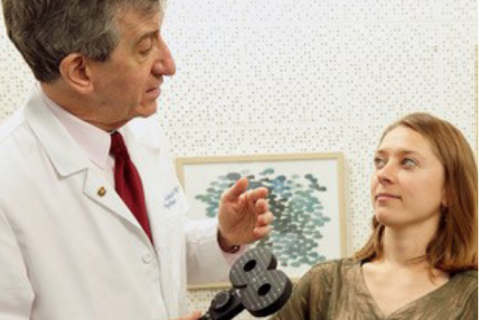The high-fat, low-carbohydrate ketogenic diet is more than just a trendy weight-loss tactic. It has also been known to help control seizures in children with epilepsy, particularly those who don’t respond to first-line anti-seizure medications.
In a new UCLA study published in the journal Cell Reports, researchers demonstrate that the changes the diet causes in the human gut microbiome — the trillions of bacteria and other microorganisms that live in the digestive tract — can confer protection against seizures in mice.
Understanding how the function of the microbiome is altered by the diet could aid in the development of new therapeutic approaches that incorporate these beneficial changes while avoiding certain drawbacks of the diet, said the study’s lead author, Gregory Lum, a postdoctoral researcher in the laboratory of UCLA professor Elaine Hsiao.
The ketogenic diet is not recommended as a primary anti-seizure option because patients are often averse to drastic changes in their food intake or have trouble staying on the diet due to its strict requirements and potential side effects like, nausea, constipation and fatigue.
In the hope of finding new ways to more effectively treat seizures in the approximately one-third of people with refractory epilepsy who don’t respond to existing anti-seizure medications, Lum sought to understand the underlying molecular mechanisms behind diet’s alteration of the human gut microbiome.
Previous research conducted by Hsiao’s lab had found that in a mouse model bred to mimic epilepsy, mice fed a ketogenic diet had significantly fewer seizures than mice fed a standard diet. Lum took that research step further, studying how the gut microbiome is beneficially altered in children with epilepsy who start ketogenic diet therapy. To that end, he transplanted fecal samples from pediatric epilepsy patients on the diet into mice to gauge whether the diet-associated gut microbiota would protect the mice against seizures.
The fecal samples were collected in collaboration with UCLA’s Ketogenic Diet Therapy Program from 10 pediatric epilepsy patients who did not respond to anti-seizure medication and were subsequently treated with the ketogenic diet. The samples were taken both before they started the diet and after one month on the diet.
The study found that the mice that received fecal transplants from patients collected after a month on the diet were more resistant to seizures than mice that received pre–ketogenic diet fecal transplants.
Importantly, the study also found that in the pediatric patients, the ketogenic diet altered key gut microbiome functions related to fatty acid oxidation and amino acid metabolism — and that these changes were preserved when the fecal matter was transplanted into the mice.
While more research on these changes is needed, Lum said, the study holds promise as a step toward finding new microbiome-based therapies for pediatric epilepsy patients who do not respond to standard anti-seizure medications.
“Narrowing down the functions of the microbes that are beneficial toward seizure protection can potentially lead to new ways to enhance the efficacy of the ketogenic diet or to mimic its beneficial effects,” he said.



